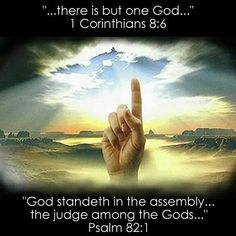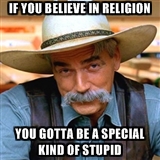|
Christian Deceptions: One God Out Of Many

It's commonly thought among scholars that Judaism began as a polytheistic religion and was later edited to become monotheistic. Here are some residual verses from that time. When Elyon divided the nations, when he separated the sons of Adam, he established the borders of the nations according to the number of the sons of the gods. Yahweh's portion was his people, [Israel] his allotted inheritance. (Deut. 32:8-9) Here we see Elyon, the head of the divine pantheon, dividing humankind among his children, giving each his inheritance. The idea of a divine pantheon with a chief deity, his consort, and their children (the council of the gods) was widespread through the Ancient Near East. Elyon (short for El Elyon) is the chief god, not just in Jewish writings but also in Canaanite literature. The passage concludes with Yahweh receiving Israel as his inheritance. We learn more about terms like "sons of the gods" by widening our focus to consider Ugaritic (Canaanite) texts. Ugarit was a Canaanite city destroyed along with much of the Ancient Near East during the Bronze Age Collapse in roughly 1200 BCE, a period of widespread chaos in that part of the world from which Israelite civilization seems to have grown. The Ugaritic texts state that El and his consort Asherah had 70 sons, which may be the origin of the 70 nations (or 72) that came from Noah's descendants listed in Genesis 10. Then [Elohim] said, "Let us make mankind in our image, in our likeness" (Genesis 1:26). The pronoun "us" is used. The clever apologetics was that this was the trinity. But why would Genesis assume that the early Israelite reader knew about the trinity without even explaining it? Some argue that it was angels helping God with his creation, but why would an omnipotent god need help from angels? [Elohim] stands in the assembly of El; in the midst of the gods he renders judgment. (Psalm 82:1). For who in the skies can compare to [Jehovah]? Who is like [Jehovah] among the [sons of God], a God who is honored [in the great assembly of the holy ones], and more awesome than all who surround him? (Ps. 89:6-7) Here we see the concept of a divine council. For [Jehovah] is the great God, and the great King above all gods (Ps. 95:3). All the gods bow down before [Jehovah] (Ps. 97:7). I know [Jehovah] is great, and our Lord is superior to all gods. (Ps. 135:5) And many more verses celebrate Jehovah while acknowledging the existence of others. We've seen where the Bible documents how Yahweh lost a fight with the Moabite god Chemosh (2 Kings 3:27). "God standeth in the congregation of the mighty; he judgeth among the gods." Psalms 82:1 KJV "Who is like unto thee, O Lord, among the gods? who is like thee, glorious in holiness, fearful in praises, doing wonders?" Exodus 15:11 KJV Genesis 3:22: "And the LORD God said, Behold, the man is become as one of us, to know good and evil: and now, lest he put forth his hand, and take also of the tree of life, and eat, and live for ever:" https://www.patheos.com/blogs/crossexamined/2016/01/biblical-polytheism-jewish/
|
Send comments to:
 hjw2001@gmail.com
hjw2001@gmail.com
|







